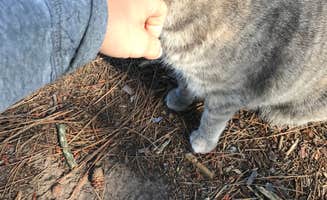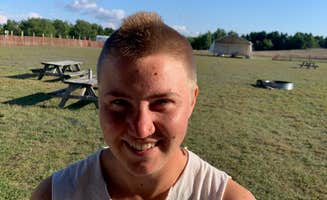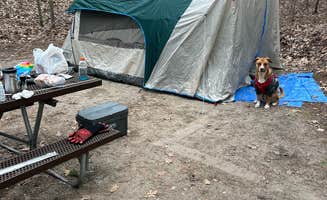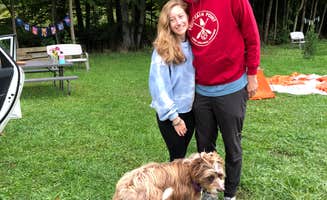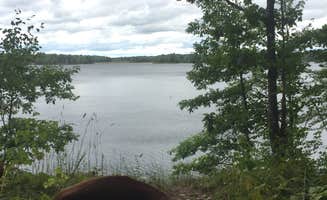Lake Michigan shorelines and inland forests define the terrain around Empire, Michigan. The area sits at approximately 640 feet above sea level with summer temperatures typically ranging 65-80°F and winters dropping to 15-30°F. The region contains diverse camping ecosystems from beachfront to dense woodland sites with most campgrounds sitting within 15-30 minutes of popular attractions.
What to do
Beach exploration: Just minutes from D.H. Day Campground, campers can access Lake Michigan via boardwalks. "Going into Glen Arbor is fun and checking out all the different parts of Sleeping Bear is a treat," notes Taylor D., who has camped there for over a decade.
River activities: Set up at Platte River Campground for water-based adventures. "Kayaked the North branch, which was winding and fast moving. Go when they release the salmon from the hatchery - you feel all the salmon brush against your kayak as they swim upstream!" recommends Joyce B.
Mountain biking: Access extensive trail systems from Leelanau Pines Campground. "The bike paths from Sutton's Bay to Traverse City and from Pyramid Point to Empire were fantastic!" notes Cindy B., who explored the region extensively during her stay.
Night kayaking: Experience the Platte River after dark for a unique perspective. "We camp on full moon nights and hit the river for night kayaking. We have our favorite site too!" shares Nikki M., who visits multiple times annually from nearby Traverse City.
What campers like
Spacious sites: Empire Township Campground offers larger-than-average camping areas. "Site 20 was large, and super spacious. There was our own private trail to the vaulted toilets which were always clean, stocked with T.P. And had a clean trash bag in place," describes Justyna E.
Lake access: Water-based camping opportunities abound throughout the region. At Lake Dubonnet Trail Camp, "most of the sites have their own path right down to the water," explains Kate K., adding it's "great for early morning paddles and peaceful relaxation."
Affordability: State forest campgrounds typically cost $15-25 per night with self-registration systems. "This is a great location based around Traverse City and Sleeping Bear Dunes areas," notes Phil M. about staying near Empire, finding value in the central access to multiple attractions.
Privacy between sites: Many campgrounds offer natural separation. Platte River Campground features "sites in the three loops nicely placed so that you have foliage and space between sites," according to Anne G., who appreciates the balance of solitude and community.
What you should know
Seasonal extremes: Weather varies dramatically by season. "Went there in late October of 2022 and man was it a cold night to stay in a tent. We got there late, put tents up in the dark, ate dinner late from a local watering hole," shares Doug P. about D.H. Day Campground.
Wildlife precautions: Bears are present in multiple campgrounds. One camper at Platte River Campground noted, "Was told a black bear visits the campgrounds at least once a week, but is not much a nuisance as long as campers store their food in the car."
Road noise: Some campgrounds experience traffic sound. Traverse City State Park campers note highway proximity creates "noise increased by the very busy highway 31 in front and the airport and railroad behind."
Reservation requirements: Popular campgrounds fill months in advance. "Reservations are extremely hard to get for this park. If you want a weekend campsite, you must book six months in advance!" advises a Platte River Campground visitor.
Tips for camping with families
Playground access: Turtle Lake Campground offers dedicated play spaces. "What I liked best about this park was that my children were not caked in dirt. While I understand that comes with the territory of camping, this campground provides a bit more of a grassy setting and offers a nice playground," notes Ann D.
Educational programs: Several campgrounds provide ranger-led activities. "The amphitheater with kid focused programs was a great bonus," mentions Jeffrey R. about D.H. Day Campground.
Hiking difficulty: Trail systems vary dramatically in accessibility. "The trail from Loop 1 is 1.2 miles to Lake Michigan. If you like to walk, be sure to walk out there. The end is complete sand so be prepared to work hard!" advises a Platte River visitor.
Insect preparation: Bug populations peak in early summer. "Even after applying a ton of bug spray we felt like we were getting eaten alive on the trail," reports Katie D. about paths near Platte River Campground.
Tips for RVers
Site selection: Carefully research pull-through options at Platte River Campground. "Some pull through sites are VERY small so be careful when you book your reservation," warns a reviewer who found size limitations challenging.
Leveling challenges: Terrain often requires adjustments. At Leelanau Pines Campground, staff assistance makes a difference: "when they escorted us to the site & helped us back in they had levels they brought & put under one side of the travel trailer to level us."
Power limitations: Electric hookups vary by campground section. At Turtle Lake Campground, campers note full hookup options but recommend checking amperage requirements when booking since some sections offer different electrical capacities.


